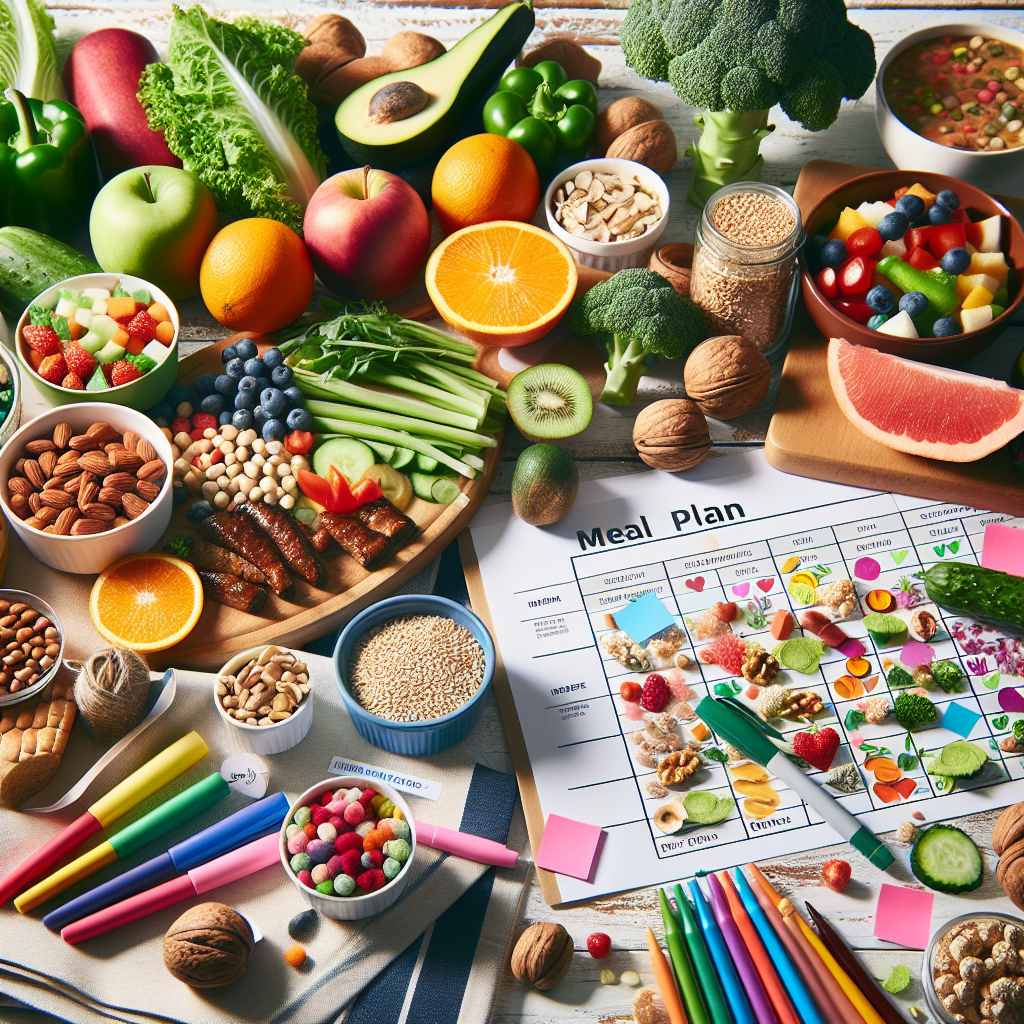Nutritional Tips for Healthy Meal Plans
Looking to improve your health and wellness? Look no further! This article provides nutritional tips that will help you in developing healthy meal plans. Whether you’re trying to lose weight, get fit, or simply maintain a healthy lifestyle, proper nutrition is key. From incorporating superfoods into your diet to exploring specialized diets like keto or vegan, this article covers a wide range of topics to give you a holistic understanding of nutrition. So, grab a pen and paper and get ready to jot down some tips that will nourish both your body and mind!
Importance of Nutritional Tips
How good nutrition impacts health and well-being
Good nutrition plays a vital role in maintaining overall health and well-being. It provides the body with the necessary nutrients, vitamins, and minerals it needs to function optimally. When you consume a well-balanced diet, you support your immune system, boost your energy levels, and reduce the risk of chronic diseases like obesity, diabetes, and heart disease. Additionally, good nutrition can improve your mood, enhance mental clarity, and promote healthy aging. By prioritizing your nutritional needs, you are taking proactive steps towards a healthier, happier life.
Why healthy meal planning is essential
Healthy meal planning is an essential component of maintaining a nutritious diet. Planning your meals ahead of time allows you to make intentional choices about the foods you consume. It helps you stay on track with your health goals, avoid impulsive food choices, and save time and money. By creating a meal plan, you can ensure that you are incorporating a variety of nutrient-rich foods into your diet, including fruits, vegetables, lean proteins, whole grains, and healthy fats. This way, you can create a balanced and wholesome meal plan that supports your overall health and well-being.
Basics of Nutrition
Understanding macros and micros
Macronutrients (macros) and micronutrients (micros) are essential for a healthy body and vibrant lifestyle. Macronutrients consist of carbohydrates, proteins, and fats, which provide energy and support various bodily functions. Micronutrients include vitamins and minerals, which are necessary for growth, development, and proper functioning of the body. Understanding the importance of both macros and micros allows you to make informed choices about the foods you consume and ensure that your body has all the necessary nutrients to thrive.
Importance of a balanced diet
Maintaining a balanced diet is key to achieving optimal health. A balanced diet involves consuming a variety of foods from different food groups in the right proportion. This includes fruits, vegetables, whole grains, lean proteins, and healthy fats. Each food group provides unique nutrients, vitamins, and minerals that are crucial for different bodily functions. By incorporating a variety of foods into your diet, you can ensure that you are getting all the essential nutrients your body needs to stay healthy and function at its best.
Essential nutrients for a healthy body
To maintain a healthy body, it is important to consume a diet that is rich in essential nutrients. These nutrients include carbohydrates, proteins, fats, vitamins, minerals, and water. Carbohydrates provide energy, proteins are essential for growth and repair, fats support brain function and hormone regulation, vitamins and minerals are involved in various bodily processes, and water is crucial for hydration and overall health. By including foods from all food groups and staying hydrated, you can ensure that your body receives the necessary nutrients to function optimally.

Building a Healthy Meal Plan
Determining calorie needs
When creating a healthy meal plan, it is important to determine your calorie needs. This can be done by considering factors such as your age, sex, activity level, and overall health goals. Caloric needs vary from person to person, so it is important to find the right balance that supports your individual needs. You can use online calculators or consult with a registered dietitian to determine your daily calorie intake. Once you have an estimate of your calorie needs, you can structure your meals accordingly to ensure that you are meeting your nutritional goals.
Choosing the right macronutrient ratio
In addition to determining your calorie needs, it is important to choose the right macronutrient ratio for your meal plan. This ratio refers to the proportion of carbohydrates, proteins, and fats in your diet. The ideal macronutrient ratio varies depending on individual goals and preferences. For example, athletes may require a higher proportion of carbohydrates for energy, while individuals looking to build muscle may focus on a higher protein intake. Consulting with a registered dietitian can help you determine the macronutrient ratio that best suits your needs.
Incorporating fruits and vegetables
Fruits and vegetables are nutritional powerhouses that should be a staple in any healthy meal plan. They are rich in vitamins, minerals, antioxidants, and fiber, which are essential for overall health and well-being. Aim to incorporate a variety of fruits and vegetables into your meals and snacks. Choose colorful options to ensure a wide range of nutrients. Whether you enjoy them raw, cooked, or blended into smoothies, fruits and vegetables should occupy a significant portion of your plate to promote optimal nutrition.
Quality protein sources
Protein is an important macronutrient that plays a crucial role in building and repairing tissues, supporting muscle growth, and maintaining a strong immune system. Incorporating quality protein sources into your meal plan is essential for overall health. Lean meats, poultry, fish, dairy products, legumes, and plant-based proteins such as tofu and tempeh are all excellent sources of protein. Aim to include a variety of protein sources in your meals to ensure that you are meeting your protein needs and enjoying a balanced diet.
Whole grain and fiber-rich foods
Whole grains and fiber-rich foods are essential for digestive health and maintaining a healthy weight. They are rich in fiber, which aids in digestion, helps regulate blood sugar levels, and promotes satiety. Incorporating whole grain bread, rice, pasta, and cereals into your meal plan can provide sustained energy and promote overall health. Additionally, legumes, nuts, seeds, and fruits are excellent sources of fiber. By including these foods in your diet, you can support a healthy digestive system and ensure optimal nutrition.
Healthy fats for optimal nutrition
Contrary to popular belief, healthy fats are an important part of a balanced diet. They provide energy, help absorb vitamins, and support brain health. Healthy fats can be found in foods such as avocados, nuts, seeds, olive oil, and fatty fish like salmon. Including these sources of healthy fats in your meal plan can provide essential nutrients while adding flavor and satiety to your meals. Remember to consume fats in moderation and choose healthier options to support optimal nutrition.
Superfoods for Nutritional Boost
Benefits of incorporating superfoods
Superfoods are nutrient-dense foods that offer numerous health benefits. They are rich in antioxidants, vitamins, minerals, and other beneficial compounds that can help support overall health and well-being. By incorporating superfoods into your meal plan, you can enhance your nutritional intake and promote optimal health. Superfoods have been linked to various health benefits, including reduced inflammation, improved heart health, enhanced brain function, and strengthened immunity.
Top superfoods for overall health
While there are many superfoods to choose from, some have gained popularity for their exceptional nutritional value. Berries, such as blueberries, strawberries, and raspberries, are packed with antioxidants and can boost brain function. Leafy greens like spinach and kale are rich in vitamins, minerals, and fiber, and can support heart health. Other superfoods include fatty fish, like salmon, which are high in omega-3 fatty acids, and nuts and seeds that provide essential nutrients and healthy fats. By incorporating these top superfoods into your meal plan, you can provide your body with a powerful nutritional boost.
Superfoods for specific health goals
In addition to promoting overall health, superfoods can also be targeted to support specific health goals. For example, chia seeds and flaxseeds are rich in omega-3 fatty acids and fiber, making them beneficial for heart health and digestion. Turmeric, with its powerful anti-inflammatory properties, can be beneficial for individuals with joint pain or inflammation. Quinoa and lentils are excellent sources of plant-based protein, making them ideal for individuals following a vegetarian or vegan diet. By selecting superfoods that align with your specific health goals, you can maximize the nutritional benefits and support your overall well-being.

Meal Prep Ideas for Busy Individuals
Benefits of meal prepping
Meal prepping is a game-changer for busy individuals looking to maintain a healthy diet. By dedicating time to prepare meals in advance, you can save valuable time during the week and avoid making impulsive food choices. Meal prepping allows you to have nutritious meals readily available, ensuring that you stay on track with your health goals. It can also help you save money by reducing food waste and allowing you to buy ingredients in bulk. Additionally, meal prepping promotes portion control and mindful eating, leading to healthier food choices and improved overall nutrition.
Tips for efficient meal planning
Efficient meal planning starts with careful consideration of your weekly schedule. Take a few minutes to plan your meals for the week, considering any upcoming events or commitments. Look for recipes that can be prepared in batches and easily adapted to fit different meals. Make a shopping list based on your meal plan to ensure that you have all the necessary ingredients on hand. Consider batch cooking on the weekends to prepare larger quantities of staples like grains, proteins, and sauces. By being organized and strategic in your meal planning, you can maximize efficiency and ensure that you have healthy meals readily available throughout the week.
Batch cooking and storing strategies
Batch cooking is a fantastic way to save time and ensure that you always have healthy meals on hand. Dedicate a few hours each week to prepare larger quantities of staple ingredients, such as grains, proteins, and roasted vegetables. Divide the cooked food into individual portions and store them in airtight containers or meal prep containers. These containers can be refrigerated or frozen, depending on your needs. When ready to eat, simply reheat the prepped meals and add fresh ingredients for added flavor and variety. By utilizing batch cooking and storing strategies, you can simplify mealtime and make healthy eating a breeze.
Meal prep ideas for breakfast, lunch, and dinner
Healthy meal prep can be done for breakfast, lunch, and dinner. For breakfast, consider prepping overnight oats or chia seed pudding that can be left to soak overnight and enjoyed in the morning. Hard-boiled eggs, Greek yogurt, and pre-cut fruits are also convenient options. For lunch, prepare salads in mason jars or pre-portioned containers including a variety of vegetables, proteins, and dressings. Grain bowls with cooked quinoa or brown rice, roasted vegetables, and grilled chicken are also great options. For dinner, batch cook proteins like chicken, salmon, or tofu, along with whole grains and roasted vegetables. These can be combined into various dishes throughout the week, such as stir-fries, salads, or wraps. By prepping these meals ahead of time, you can ensure that you have a delicious and nutritious meal ready to enjoy.
Nutritional Supplements to Consider
When are supplements necessary?
Nutritional supplements can be beneficial when dietary intake may not meet specific nutrient needs. Factors such as dietary restrictions, specific health conditions, or limited food access may require supplementation. It is important to note that supplements should not replace a balanced diet but should complement it. If you are unsure whether you might need a supplement, it is best to consult with a healthcare professional or a registered dietitian who can assess your individual needs and recommend appropriate supplements if necessary.
Key supplements for different dietary needs
There are key supplements that can be considered based on specific dietary needs. For individuals following a vegetarian or vegan diet, a B12 supplement is recommended as this vitamin is mainly found in animal products. Omega-3 fatty acid supplements derived from fish oil or algae can be beneficial for individuals who do not consume fatty fish regularly. Pregnant women may require iron and prenatal vitamins to support the healthy development of the fetus. Individuals with vitamin D deficiency or limited sun exposure may benefit from vitamin D supplementation. These supplements should be taken under the guidance of a healthcare professional to ensure proper dosage and safety.
Safety and precautions while taking supplements
While nutritional supplements can be helpful, it is important to take them with caution. Natural does not always mean safe, and some supplements may interact with medications or have potential side effects. It is crucial to consult with a healthcare professional or registered dietitian before starting any new supplement. They can guide you on the appropriate dosage, potential interactions, and help you choose reputable brands. Additionally, it is important to remember that supplements should not replace a balanced diet. They are meant to complement a healthy lifestyle and should be used as directed.
Tips for Healthy Snacking
Importance of mindful snacking
Mindful snacking is an important aspect of a healthy diet. Snacking provides an opportunity to refuel your body between meals and can help prevent overeating or reaching for unhealthy options when hunger strikes. By practicing mindful snacking, you can pay attention to your hunger cues, choose nutritious options, and enjoy your snacks without guilt. Mindful snacking involves being present and focusing on the taste, texture, and satisfaction that comes from eating. By being mindful, you can make intentional choices that support your overall health and well-being.
Healthy snack options for different dietary preferences
When it comes to healthy snacking, there are plenty of options to choose from, regardless of your dietary preferences. For individuals following a vegetarian or vegan diet, snacks like hummus with vegetables, roasted chickpeas, or almond butter with apple slices are nutritious choices. Greek yogurt, cottage cheese, or hard-boiled eggs can provide protein for those following a high-protein diet. Snack options for those following a gluten-free diet include rice cakes, nut-based bars, or gluten-free crackers with avocado. Regardless of your dietary preferences, focus on snacks that contain a balance of protein, healthy fats, and fiber to keep you satisfied between meals.
Smart snacking strategies for weight management
Snacking smartly can be beneficial for weight management and overall health. To avoid mindless snacking or overeating, practice portion control by pre-portioning snacks into individual servings. This prevents eating directly from the bag or container, which can lead to consuming more than intended. When selecting snacks, choose nutrient-dense options that are low in added sugars and refined grains. Fresh fruits and vegetables, nuts and seeds, plain Greek yogurt, and air-popped popcorn are all satisfying options for smart snacking. Be mindful of your hunger levels and eat when you are genuinely hungry, rather than out of boredom or emotional triggers.
Eating for Weight Loss
Creating a calorie deficit
Weight loss is often achieved by creating a calorie deficit, which means consuming fewer calories than your body needs to maintain its current weight. While the magnitude of the calorie deficit varies for each individual, a general guideline is to aim for a deficit of 500-1000 calories per day to promote gradual and sustainable weight loss. This can be achieved through a combination of reduced calorie intake and increased physical activity. However, it is important to approach weight loss with a balanced and nourishing mindset rather than restrictive dieting. Focus on nutrient-dense foods and make sustainable lifestyle changes to support long-term weight management.
Dietary modifications for weight loss
When aiming to lose weight, making dietary modifications is essential. Start by examining your current eating habits and identifying areas where you can make healthier choices. Reduce your intake of processed and high-calorie foods, such as sugary snacks, fried foods, and sugary beverages. Instead, focus on incorporating whole, unprocessed foods into your diet, such as fruits, vegetables, lean proteins, whole grains, and healthy fats. Be mindful of portion sizes and practice mindful eating to avoid overeating. It is also important to stay hydrated and limit your intake of sugary drinks. By making these dietary modifications, you can support weight loss and improve your overall well-being.
Meal timing and frequency for weight management
Meal timing and frequency can play a role in weight management. While there is no one-size-fits-all approach, some strategies may be beneficial. Some individuals find success with intermittent fasting, which involves reducing the eating window to a specific timeframe each day. This can help regulate calorie intake and improve insulin sensitivity. Others may benefit from spreading meals evenly throughout the day, including regular snacks to prevent excessive hunger and overeating. Experiment with different approaches and find what works best for you. It is also important to listen to your body’s hunger and fullness cues and eat when you are genuinely hungry.
Nutrition and Exercise
Fuelling the body for exercise
Proper nutrition is essential for fueling your body for exercise. Before a workout, it is important to consume a balanced meal or snack that provides carbohydrates for energy and a small amount of protein for muscle repair and recovery. Complex carbohydrates, such as whole grains and fruits, are excellent choices as they provide sustained energy. Additionally, drinking water and staying hydrated before, during, and after exercise is crucial for optimal performance. Remember to listen to your body and adjust your pre-workout nutrition based on personal preferences and individual needs.
Pre and post-workout nutrition
Pre and post-workout nutrition are important components of an effective exercise routine. Prior to a workout, aim to consume a small meal or snack that includes easily digestible carbohydrates and a moderate amount of protein. This can be a banana with nut butter, a yogurt parfait with granola, or a small smoothie. The goal is to provide your body with adequate energy to fuel your workout. After exercising, it is crucial to replenish your body with nutrients and aid in muscle recovery. This can be achieved by consuming a combination of carbohydrates and protein, such as a protein shake, a turkey wrap, or a smoothie with added protein powder.
Importance of hydration during workouts
Hydration plays a crucial role in exercise performance and overall health. During a workout, your body loses water through sweat, and it is important to replenish those fluids to maintain optimal hydration. Staying properly hydrated helps regulate body temperature, supports cardiovascular function, and prevents dehydration and fatigue. It is recommended to drink water before, during, and after exercise, especially during intense or prolonged workouts. Remember to listen to your body’s thirst cues and drink fluids accordingly. Consider sports drinks or electrolyte-enhanced beverages for longer, high-intensity workouts to replenish electrolytes lost through sweat.
Nutrition for muscle recovery
Nutrition plays a vital role in muscle recovery after exercise. Consuming an adequate amount of protein after a workout is essential for muscle repair and growth. Aim to consume high-quality protein sources, such as lean meats, poultry, fish, eggs, or plant-based proteins, within 30-60 minutes after exercise. Additionally, carbohydrates are important for replenishing glycogen stores, which provide energy for your next workout. Including a combination of protein and carbohydrates in your post-workout meal or snack can aid in muscle recovery and optimize exercise performance. Prioritize nutrient-dense foods to provide your body with the necessary building blocks for muscle repair and growth.
Eating Well on a Budget
Tips for affordable and nutritious food choices
Eating well on a budget is not only possible but also essential for maintaining a healthy lifestyle. Here are some tips for affordable and nutritious food choices:
-
Plan your meals and make a shopping list: Planning your meals ahead of time can help you avoid impulsive purchases and ensure that you are buying only what you need.
-
Buy in bulk: Purchasing staple items in bulk can help you save money in the long run. Foods like rice, beans, nuts, and seeds can be bought in larger quantities and stored for a longer period.
-
Shop seasonally: Fruits and vegetables that are in season tend to be more affordable and have better flavor. Plan your meals around seasonal produce to maximize nutritional value and minimize costs.
-
Cook at home: Eating out can be expensive, so try to cook your meals at home as much as possible. This allows you to have control over the ingredients and portion sizes, saving money and promoting healthier choices.
-
Use leftovers creatively: Repurposing leftovers into new meals or incorporating them into salads and grain bowls can help minimize food waste and stretch your budget.
Meal planning strategies for budget-friendly meals
Meal planning is an effective strategy for creating budget-friendly meals. Here are some meal planning strategies to help you eat well on a budget:
-
Plan meals around sale items: Check grocery store circulars or online deals to identify sale items. Incorporate these items into your meal plan to save money.
-
Focus on legumes and grains: Legumes and grains are affordable sources of protein and complex carbohydrates. Recipes like chili, lentil soup, or bean-based salads can be nutritious and budget-friendly.
-
Incorporate affordable proteins: Chicken, eggs, canned tuna, and frozen fish are often more affordable protein options compared to red meats or seafood. Look for sales or bulk options to save even more.
-
Embrace frozen fruits and vegetables: Frozen fruits and vegetables are often cheaper than fresh options and can be just as nutritious. They are perfect for smoothies, stir-fries, and soups.
-
Cook in batches and freeze: Batch cooking can save both time and money. Prepare larger quantities of meals and freeze individual portions for quick and convenient meals later.
Making the most of seasonal produce
Seasonal produce not only provides better flavor and nutritional value but is often more affordable as well. Here are some tips for making the most of seasonal produce:
-
Visit local farmers markets: Farmers markets often offer a wide variety of seasonal produce at competitive prices. Support local farmers while enjoying the freshest fruits and vegetables.
-
Preserve seasonal produce: Take advantage of seasonal abundance by preserving fruits and vegetables through methods such as freezing, canning, or fermenting. This allows you to enjoy them throughout the year.
-
Adapt recipes to incorporate seasonal produce: Look for recipes that highlight seasonal ingredients. This allows you to showcase the flavors and nutrients of the produce while keeping costs down.
-
Grow your own produce: Consider starting a small garden to grow your own fruits, vegetables, and herbs. This can be a cost-effective and rewarding way to enjoy seasonal produce.
-
Experiment with new recipes: Seasonal produce may include unique or less commonly used ingredients. Challenge yourself to try new recipes and explore different ways to incorporate seasonal produce into your meals.
Eating well on a budget doesn’t mean compromising on nutrition or taste. By applying these tips and making conscious choices, you can maintain a healthy diet while keeping your expenses in check.
In conclusion, nutritional tips are essential for maintaining a healthy lifestyle. Understanding the basics of nutrition, building a healthy meal plan, incorporating superfoods, and considering nutritional supplements can all contribute to optimizing your health and well-being. Additionally, learning about healthy snacking, eating for weight loss, and fueling your body for exercise can help you achieve your fitness goals. Lastly, by implementing meal prep ideas and making cost-effective choices, you can continue to eat well on a budget. Remember to prioritize your nutrition and make choices that support your overall health and well-being.
















It's great that you talked about how business insurance can provide financial protection against unexpected events and help ensure the…
I like that you mentioned how business insurance is essential for protecting your bottom line and the long-term viability of…